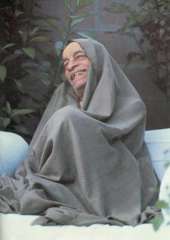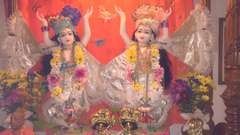...about the organization of seminars in Valparaíso and SOuth America
All Glories to Sri Sri Goura-Nitay
All Glories to Srila Prabhupada
All Glories to H.H. Hanumatpresaka Swami
Please accept my most humble obeisance
Hare Krsna Guru Maharaja, I hope that your health is acceptable and you are finally getting some rest. My name is Ignacio González, from Valparaíso.
ASA - AGTSP.... We remember you Ignacio. Your wife, baby and cat!
Now I´m writing to give you some news about the seminars that we have been arranging for your visit in November to Valparaíso, Chile.
We have being organizing at two universities:
1. With the Santa Maria University (UTFSM), but we haven´t got any answer from them yet… we will keep trying. Anyway this has been the modus operandi for the last 2 years.
2. We have confirmed a seminar in the Pontifical Catholic’s university of Valparaiso (PUCV) about “el cantar de cantares”. Will attend 3 theologian teachers from the university, to discuss different aspects of the seminar. Here are the links so you can see their curriculums:
a. Dr. Kamel Harire https://www.dropbox.com/s/au82iix07diyc2k/Curr%C3%ADculum%20%20Kamel%20Harire.doc
b. Dr. Gonzalo Ulloa https://www.dropbox.com/s/td09udtnrwcev68/Curr%C3%ADculum%20Gonzalo%20Ulloa.doc
c. Dr. Juan Daniel Escobar https://www.dropbox.com/s/r34qaxsalvbfjgc/Curriculum%20Vitae%20Juan%20Escobar%20%281%29.doc
All public (60) will be university students of this and other universities. Also will be invited different academicians of the university.
The people of the university ask us for a little summary of the presentation for advertising in the university, and also for the theologian teachers that will discuss with you because they want to prepare themselves for you. In addition, do we have an official name for this presentation?
That´s all for now. Anything that concerns, worries or bothers you please let me know, so I can try to repair the situation.
Your lousy servant
Ignacio
HpS - AGTSP. AGAIN. We are still not sure that we are coming to South America this year. After we get back to Nashville and settle down for a few months and WRITE then we will know for sure. But this work on Song of Songs is very, very useful. The title will be The Song of Songs of Solomon and the Bhakti-rasa-amrta of Srila Rupa Goswami. Is tha O.K? You have to keep writing about this and talking to us and see that the work is going on. It seems 87.332% we will be there as planned and 97.11% that any work we do will be published and even if we don't attend the seminar can go on with great enthusiasm.

